Ban on international travel extended by another three months, cops warn protesters
A ban on international holidays has been extended by another three months. It comes as Assistant Commissioner Luke Cornelius warned protesters to stay away from the CBD on Saturday, saying “police will be ready for you”.
Coronavirus
Don't miss out on the headlines from Coronavirus. Followed categories will be added to My News.
This coronavirus article is unlocked and free to read in the interest of community health and safety. Get full digital access to trusted news from the Herald Sun and Leader for just $1 a week for the first 12 weeks.
Victoria has recorded 113 new infections on Thursday.
The health department also confirmed 15 more deaths — four males and three females in their 80s and two males and six females in their 90s — taking the state’s death toll to 591.
Fourteen of those 15 deaths are linked to aged care outbreaks.
Nine deaths took place prior to Wednesday and eight of those reclassified deaths occurred at one facility.
361 Victorians are currently in hospital, 20 of those are receiving intensive care and 15 of those 20 are on a ventilator.
Of the 2295 current active cases in Victoria, 2125 are in metropolitan Melbourne, 126 are in regional Victoria, 38 are either unknown or subject to further investigation, six are interstate residents.
There are 38 active cases in Greater Geelong, Greater Bendigo has nine active cases and Ballarat has four active cases.
Wyndham had the biggest spike in infections with 18 new cases. Casey and Hume had 10 each and there were nine in Brimbank.
There are 97 cases in aged care with a total of 447 deaths in aged care and 34 active cases in residential disability facilities.
There are 337 healthcare workers with active cases, which is an increase of 35 active cases among healthcare staff.
Key outbreaks with new cases include 48 cases linked to Vawdrey Australia truck manufacturer and 19 cases have been linked to St Vincent’s Private Hospital.
PREMIER SAYS CASES WILL GUIDE ROAD OUT OF LOCKDOWN
Premier Daniel Andrews has told Victorians the roadmap out of lockdown will be guided by how many cases there are in Victoria and the types of cases.
He said there was an enormous amount of modelling taking place, which takes quite some time and thousands of scenarios were being run through various computers and processes.
Deputy Chief Health Officer Professor Allen Cheng said there had been an increase of 10 cases from an unknown source.
Prof Cheng said all of the high-risk industries in workplaces were the locations they were worried about. “Healthcare and aged care are the major ones,” Prof Cheng said.
“But we also worry about abattoirs and meatworks and other places with shield areas. But they are really quite diverse, the workplaces involved — and all workplaces need to have COVID-safe plans and prepare for circumstances if they were to have a case.”
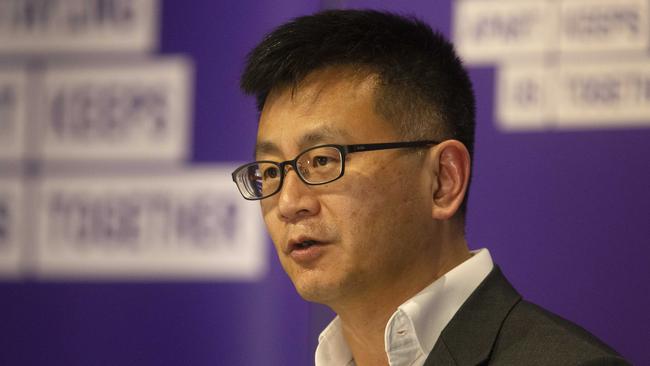
When asked about the number of infections going up, Prof Cheng said: “It’s not a day-by-day thing. But certainly we want numbers to continue to come down, if we can.
“Yesterday, there were nine cases. I can’t remember the day before that. But it certainly hasn’t been going down as quickly.
“But, really, when you get down to small numbers, chance plays quite a large role. It’s who those last people are. And we really encourage people to come forward for testing so we can pick up these chains and shut them down.
“As an example, we might be starting with a small number of cases, but if one of them, you know, is in a household and transmits to the other, then it will look like a big jump. So, we need to look at the details of those cases, not just sort of the raw number there.”
Prof Cheng said the important thing was looking for a long-term trend.
“You know, when I started work here, we’re now seeing 700 cases a day, we’re down to an
average of about a hundred cases a day. That’s substantially lower, but we need it to be, again, another, you know, magnitude lower before we start taking the next steps,” he said.
Referring to the suggestion that Victoria look at other point-of-care testings, Prof Cheng said there were two types of tests.
“There’s the ones for active infections, so the PCR that we use now, and then the serological test, which tells you if you have been infected, but not if you’re infected at this point in time,” he said.
“So, in general, the serological tests aren’t particularly helpful for public health reasons. They’re helpful for interest and so on, and for research.
“There are a number of tests that are coming, are being developed, that are what’s called antigen tests, and what’s called a lamp test. They’re not quite ready for prime time. You really need to know how good they are and how accurate they are before you deploy them. And that work is being done now and I think it’s in a fairly advanced stage. They are potentially game-changers.”
Prof Cheng said the state of emergency provided the power to quarantine people, to ensure they didn’t continue to work.
“So, without directions, even if there were very small numbers of cases, without that, we wouldn’t be able to say, for example, someone who’s a close contact can’t go to work in a hospital or an aged care home. So, they need to stay at home.
“So, these powers are needed even at small numbers, even though they might seem to be small numbers, but to stop them becoming big numbers.”
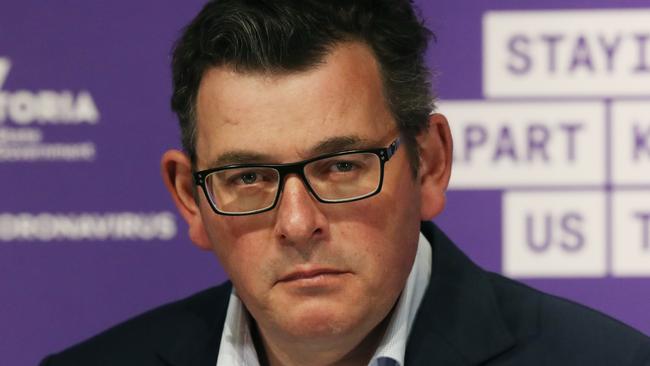
BAN ON OVERSEAS TRIPS CONTINUES
International holidays are on hold for at least another three months following an extension of the federal government’s human biosecurity emergency period.
The emergency period covers restrictions on overseas travel, restrictions on cruise ships arriving in Australia, protections for the supply and sale of certain essential goods and restrictions on retail stores at international airports.
It has been in place since March 18 and was now extended until December 17, Health Minister Greg Hunt announced on Thursday.
He said the extension of the emergency period was informed by specialist medical and epidemiological advice provided by the Australian Health Protection Principal Committee.
“AHPPC has advised that the international and domestic COVID-19 situation continues to pose an unacceptable public health risk,” Mr Hunt said.
The declaration ensures the Government has the powers to take any necessary measures to prevent and control COVID-19 and protect the health of all Australians.
- Josh Fagan
ASSISTANT COMMISSIONER ‘OUTRAGED’ OVER PROTEST PLANS
Assistant Commissioner Luke Cornelius, who labelled coronavirus conspiracy theorists as “batshit crazy”, has made a renewed plea against a weekend rally.
The Commissioner said he was “concerned and outraged” over Saturday’s planned anti-lockdown protest at the Shrine of Remembrance, saying defence force personnel had taken “great offence” at the concept.
“It is sacred ground,” Mr Cornelius said.
“It is completely inappropriate.”
Three Victorians have been charged with incitement for their role in encouraging others to protest while more than 80 people have been issued warning notices.
Mr Cornelius revealed 76-year-old Windsor man Solihin Millin had been charged with incitement for a second time over the protest.
“It is a hardcore group of people who are blatantly refusing to follow the directions,” he said.
“It (the virus) doesn’t discriminate on the basis of belief.
“These groups have always been there; by and large their impact is (usually) relatively minor. They exist in their echo chambers. But now they pose a risk like they have never posed before, the key thing that has changed is their impact.”
Mr Cornelius has stood by his comments made last week saying coronavirus conspiracy theorists were “batshit crazy” and the “tinfoil hat wearing brigade”.
“I wanted to cut through and leave people in no doubt where police stood,” he said.
“I have listened over the last couple of months with growing concern as the commentariat and the dilettante hobbyists carrying on about what police should or shouldn’t have done.
“Don’t leave home to protest, don’t be selfish.”
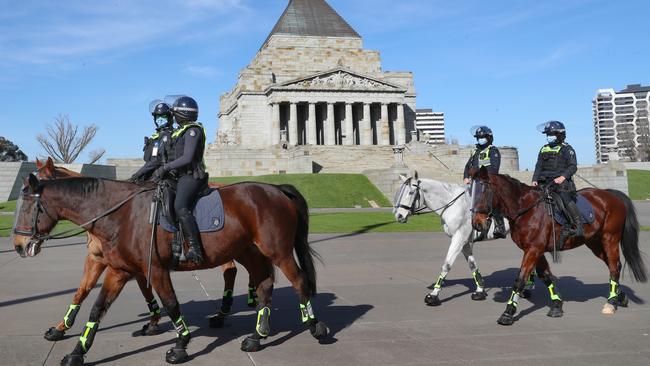
He encouraged Victorians to protest and express their views online instead of entering the CBD on Saturday.
He hit back at criticism that police policy had been contradictory, explaining the “huge difference” between the circumstances at the time of the Black Lives Matter protest compared with this weekend’s “Freedom Day” rally.
“In stage four, leaving home to protest is unlawful,” he said.
“That is the rule that applies now. Those rules did not apply during the Black Lives Matter protest.
“Leaving home to protest was a permitted activity (at the time of Black Lives Matter).
“The bottom line was we were policing under rules that permitted public protest. We are talking about a context where there is no wriggle room.”
Police say their response to the planned protest on Saturday will be “very significant” throughout Melbourne’s CBD and suburbs, saying they will saturate public transport to quiz people on their movement.
“Our aim is to prevent you from coming into the city,” Mr Cornelius said.
“Be assured we will be ready for you not only in the city, we will be ready for you when you leave home and hop on public transport or use other means to come into the city.
“We will be out there in the suburbs. We will be on the road, on public transport. You can expect the police will want to speak to you, want you to explain your permitted reason for leaving (to go to) the city.”
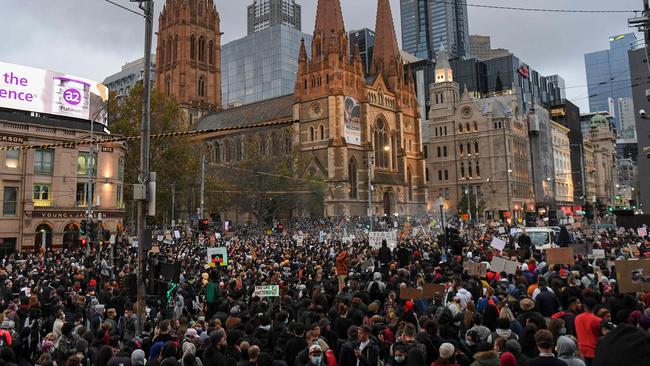
The top cop urged people to avoid the protest, saying it would be a “wonderful journey of discovery” for anyone “silly enough” to break the law.
“You would have had to have been on Mars not to know that (you cannot protest),” he said.
“If someone looked me in the eye and said ‘I didn’t know that I couldn’t protest’, I would have to say, ‘don’t take me for a fool’.
“How on earth could you say ‘I didn’t realise’. I think we have given those people every opportunity to comply.”
Victoria Police defended officers who arrested a woman in Ballarat.
“They were polite, they were professional,” Mr Cornelius said.
“Our members did everything they could to assist this individual with her concerns.”
He said the woman was allowed to get changed out of her pyjamas before she was questioned at a police station.
“They (police) were there to conduct a search warrant in the pursuit of evidence,” he said.
“This wasn’t some casual encounter, this was our members attending a premises to execute a search warrant because we believed on reasonable ground.”
Mr Cornelius said police did not discriminate when making arrests but admitted the “optics” of arresting a pregnant woman “did not look good”.
Premier Daniel Andrews said his position on anti-lockdown protests remained the same.
“There are rules,” Mr Andrews said. “We’re not gonna change those rules.
“Protests are not smart, they’re not safe, and they’re not lawful. And that’s where it’s at.”
— Brianna Travers
POLICE FINE 143 PEOPLE FOR BREAKING RULES
A hungry rule-breaker who travelled 10km from his home to buy a pizza during curfew hours was among the latest batch of Victorians to be fined for breaching lockdown rules.
Victoria Police handed down 143 fines in the past 24 hours, including 46 for breaching curfew, 24 for not wearing a mask and 11 at vehicle checkpoints.
Included in the fines is a Doncaster East man who was on a train to Flinders Station so he could meet his friends to go shopping and a Frankston man found 10km away from his address who broke curfew to get pizza.
— Sharon McGowan
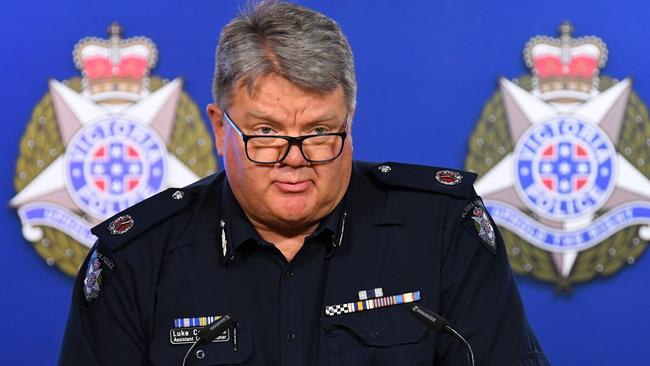
ROADMAP PLANS BEING FINALISED
When asked if stage 4 restrictions would continue past September 13, Mr Andrews said there was a power of work going on but the announcements would be made on Sunday.
“I can’t rule out that we have to continue rules,” he said.
“Everything is on the table. It will be driven by the data and the science, how many cases there are, the types of cases there are, and some modelling that is — it is a very big exercise. You’ve got computers with amazing amounts of capacity running hundreds and thousands of different options, coming back to us with a series of risks.
“So, if you do this package of changes, there’s, say, a 50 per cent risk that cases get away for us again. If you do this package of changes, there’s a 35 per cent risk, all the way through. It is a big job.”
Mr Andrews said the government was going to try to give us as much certainty as they could but they had to err on the side of caution.
“You have to assume there’s more virus out there than what we’re getting the test results for,” he said.
“If we give in to this thing — and it’s stubborn, it’s not going away quickly — if we give in to it, then all the work that we’ve all done will be worth nothing. Absolutely nothing. And we’ll be back to 600, 700, 800 cases a day. And we just can’t have that. Because we know that, with 500 or 600 people in our hospitals, that puts a lot of pressure on. A lot of pressure.”
He said not every single question could be answered on Sunday.
“We’re up against something that moves really quickly, is highly infectious, can be unstable. “In general terms, the trend, this strategy is working. Numbers are coming down. We will see days jump around a bit. But if we all stay the course on this, then everything we’ve given, everything we’ve done, every sacrifice that’s been made will count, and it will count in really big terms, because it will mean we can lock in a normal, rather than bouncing in and out of restrictions, and ultimately saying that everything Victorians have done is worth nothing.”
Mr Andrews said these were some of the most difficult decisions he had ever made in 20 years in public life but it was too early to tell people what the weeks and months after September 13 would look like.
“The responsibility I have is to do this in a safe and steady way. And that is exactly what I will do.”
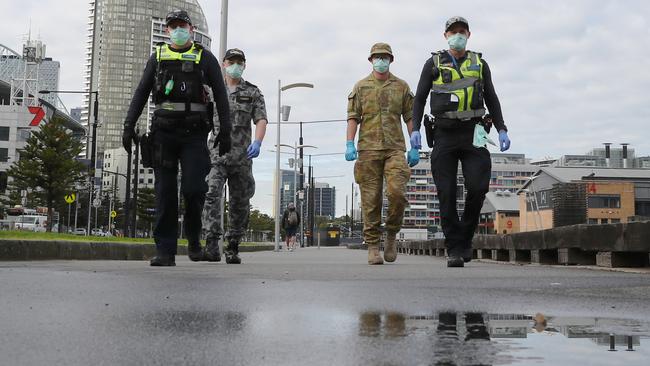
FATHER’S DAY, BORDER RESTRICTIONS
The Premier acknowledged Father’s Day was a very important day.
“It’s gonna look different this year, I know that,” he said.
“But unless it does, then other significant days, like Christmas Day, will not be anything like normal. That’s what we’re working towards. Father’s Day is a very emotional day for a lot of us, all of us, really, in one way or the other. And I’d ask kids across the state to spoil their dad, albeit it might be in a different way than you normally would.
“But let’s all reach out and look out for each other and send our love and support to dads. “Dads are great.”
The Premier said he would like to think there would be much greater freedom of movement for Victorians by the end of the year, whether interstate travel, for work, or for holidays.
He flagged further announcements about the possibility of more assistance for Victorians from September 14.
“We’ll have further announcements to make about all sorts of different matters, whether it be about the rules, about our response, about the budget to be delivered later in the year, where a very significant focus, an absolutely unprecedented focus on investing to save and create jobs will be a feature of that. But that isn’t for today,” he said.
INFECTIOUS DISEASES EXPERT QUESTIONS STAGE 4 LOCKDOWN
It comes as an infectious disease expert said he didn’t believe trying to eliminate coronavirus was a sustainable strategy as he questioned whether stage four lockdown was worth the “extra pain”.
Infectious Diseases Physician and Microbiologist Peter Collignon said it’s difficult to know “how much extra” stage four did compared to stage three restrictions.
“Stage four must have some extra benefits because it’s restricting people even more but how much extra benefit you get for the extra pain – that we haven’t worked out,” the ANU professor told 3AW.
“If you look around the world or even in Australia, the success of where you are now isn’t necessarily related to how strong your lockdowns are.”
Dr Collignon said that Victoria should look to other states, particularly NSW, as a model when it comes to easing restrictions.
He added that until there is a vaccine developed that’s 90 percent effective, elimination is unlikely.
“The elimination strategy I don’t think is sustainable over one or two years and I think you can achieve the same result without such harsh restrictions – look at Perth, look at Adelaide who achieved it without actually having stage three or four lockdowns,” he said.
“Even if we get a vaccine that’s 50 percent effective, that may save lives but it won’t stop the virus from circulating.
“I think physical distancing, hand hygiene, keeping away from work when you’re sick and keeping away from your family when you’re sick, that’s going to be with us for two years.”
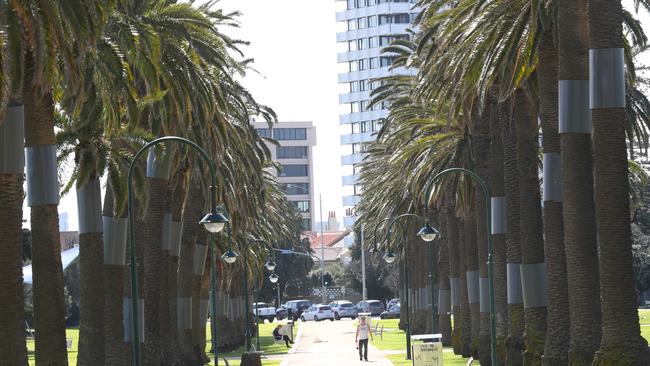
REVEALED: THE FIRST RESTRICTIONS TO BE EASED
Top-secret leaked state government documents have revealed Melbourne’s first steps out of tough stage four restrictions.
From the curfew and exercise, to face-to-face learning and visiting family, here’s what is changing and when.
Read the full story and see all the documents here.
VICTORIA HARDEST HIT BY RECESSION
Australia’s world-beating run of economic growth is over, with the worst three months on record plunging the nation into the deepest recession since the Great Depression of the 1930s.
The national economy shrank by a whopping 7 per cent between April and June as lockdown measures sparked a record crash in household spending.
Businesses aghast at lockdown road map plan. Read full story here.
Victoria was hit hardest by the collapse in consumption and the disastrous figures will only get worse, with Melbourne’s stage four lockdown delivering a $12bn blow in the September quarter while other states recover.
Treasurer Josh Frydenberg, who said the recession was “like nothing we have ever experienced”, said the federal government was considering fast-tracking income-tax cuts to deliver an economic shot in the arm.
“The road ahead will be long. The road ahead will be hard. The road ahead will be bumpy,” the Treasurer said.
“There is hope. And there is a road out.”
The 12.1 per cent slump in household spending accounted for 95 per cent of the economic hit, with families instead saving at the highest level since 1974.
Discretionary spending was down 25 per cent as interstate travel was restricted and pubs, cafes and restaurants were only allowed to sell takeaway meals. But spending on alcohol and household furnishings and equipment soared as Australians spent weeks in lockdown.
The government spent $31bn on JobKeeper payments to keep the economy afloat.
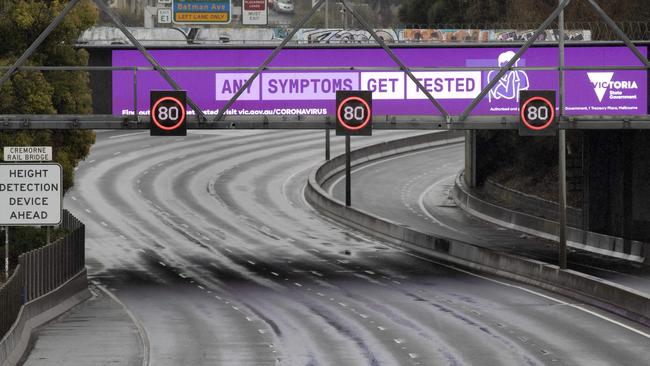
Mr Frydenberg said without the government’s support measures, the economy was predicted to shrink by more than 20 per cent. Some 700,000 jobs had been saved.
He said Australia remained in a stronger position than other countries, but with continuing restrictions in Victoria, Treasury expected another slight economic contraction in the September quarter.
The federal budget, due next month, is expected to contain further measures to kickstart the recovery.
The Prime Minister pointed to infrastructure and energy projects as a key focus. “As harsh and as severe and heavy as this blow is on Australia today, we know that as a government we have acted to seek to cushion that blow as much as we can. Australia will recover and Australia will grow again, and the jobs will come back,” Scott Morrison said.
Australian Chamber of Commerce and Industry chief James Pearson said tax cuts had to be brought forward.
“The shape of the recovery will ultimately depend on the ability and willingness of households and businesses to spend,” he said.
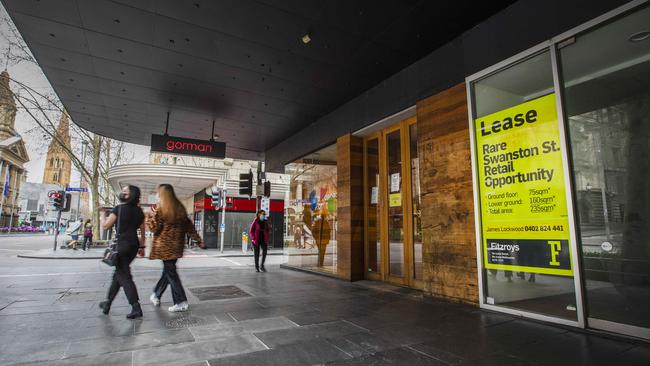
Business Council of Australia chief Jennifer Westacott agreed that with business investment “in free fall”, the government had to deliver serious tax and regulation reforms.
Opposition treasury spokesman Jim Chalmers accused the government of failing to deliver “a proper jobs plan”, threatening the economic recovery.
“In the middle of this jobs crisis, Scott Morrison and Josh Frydenberg have a plan to wind back JobKeeper, cut wages, cut super, freeze the pension, point the finger and shift the blame — but no plan for jobs,” he said.
Australian Council of Trade Unions president Michele O’Neil said: “These are the worst economic figures ever recorded, we are in an unprecedented economic and public health crisis, and yet the Morrison government has no plan for a way out.”
AGED CARE SECTOR AT CORE OF CASE RISE
Aged-care outbreaks are a major driver of Victoria’s stubborn new coronavirus cases, with infections in hot spot suburbs often linked to active cases in the sector.
But Victorian Chief Health Officer Brett Sutton said on Wednesday there were positive signs given no new clusters had been recorded.
The state on Wednesday recorded 90 new cases of the virus and six deaths — all linked to aged care.
Prof Sutton said the latest numbers were a welcome result, as infection figures often spiked in the middle of the week when more test results were received.
He said Melbourne’s northwest and parts of the southeast were still virus hot spots, with the municipalities of Dandenong and Casey of concern.
“Often in those postcode hot spots its because of the active cases in aged care,” he said.
“But there’s also community cases that are often linked to workplaces and their households. (Most transmission) is still aged care, healthcare, high-risk workplaces, other workplaces and then close contacts of known cases.
“We’re still seeing around 15 per cent as a proportion of our daily totals as mystery cases … we’re getting to single figures.”
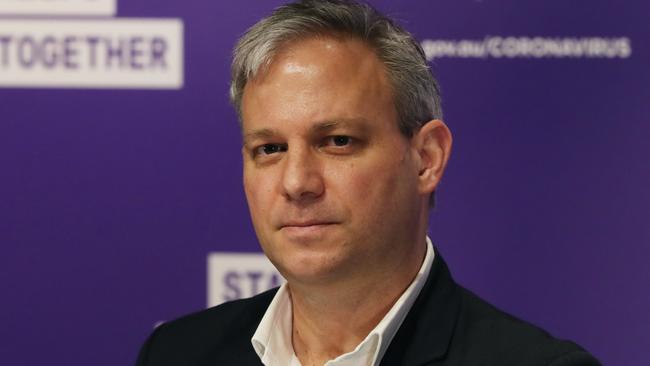
Prof Sutton said the situation was improving as infections in high-risk areas started to plateau.
“We are not seeing new outbreaks in aged care,” he said.
“The number of active cases in aged care has been coming down by 100 or so each day.”
Nearly 14,000 Victorians were tested on Tuesday — still well below the state’s daily average of about 20,000.
Daniel Andrews appealed for all Victorians with symptoms to get tested.
“It is essential to us defeating this second wave,” the Premier said.
In regional Victoria, Greater Geelong has 40 active cases — a fall of 10 — and no new cases. Bendigo has eight active cases and Ballarat has five.
Aged care has 1177 active cases, with 97 active outbreaks.
In disability facility settings, there are 35 active cases, with 23 cases among staff members and 12 cases among residents.
– Kieran Rooney
DEVIL IN DETAIL FOR STATE OF EMERGENCY DEAL
The Andrews Government is under pressure to reveal if it struck a secret deal with the Greens to extend Victoria’s State of Emergency powers.
Health Minister Jenny Mikakos on Wednesday refused to say whether an eleventh-hour agreement was made with the party to secure Samantha Ratnam’s crucial vote on the controversial legislation.
The Greens MP, who initially intended to miss the vote, came in from maternity leave in a surprise intervention to support the Bill that passed the Upper House at 2am Wednesday.
Ms Mikakos repeatedly dodged questions about whether the government had cut a deal to secure the arrangement or what of promises had been offered.
“I engaged in very constructive dialogue with all the crossbench members over the past week,” she said.
“Yes there were some compromises that were made. Significant changes made to the legislation curtailing the period to a six-month additional cap rather than the original (12-month) period.
“This is a very good outcome for the people of Victoria.”
The government backed down on its bid to extend the powers by up to 12 months after intense backlash.
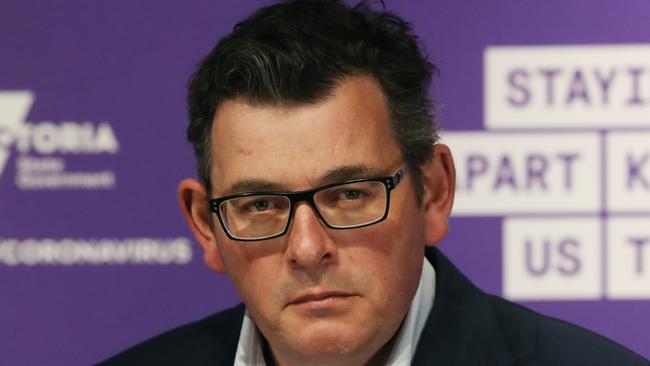
The original proposal would have given Premier Daniel Andrews and Chief Health Officer Brett Sutton the ongoing power to impose restrictions, including to wear masks or to stay at
home, without parliament’s approval until September 2021.
Opposition Leader Michael O’Brien said Ms Mikakos comments on Wednesday showed a secret deal had been done.
He said Acting Victorian Greens leader Ellen Sandell had also refused to deny a deal during a radio interview.
“They’re not prepared to tell Victorians what that was,” Mr O’Brien said.
“You can only assume the public would be angry at it.
“If there was no deal done, about any other issue, why would they have just said there was no deal.
“It was a 20-19 vote.”
Premier Daniel Andrews said the government had held a “good faith discussion” with MPs.
“Sometimes members of the crossbench will vote with us, sometimes they won’t,” he said.
“Ms Ratnam returning to parliament is entirely a matter for her.
“It’s about finding common ground. There’s been some compromise.”
The lower house is expected to vote on the Bill on Thursday, but is expected to pass because the government has the numbers.
– Kieran Rooney
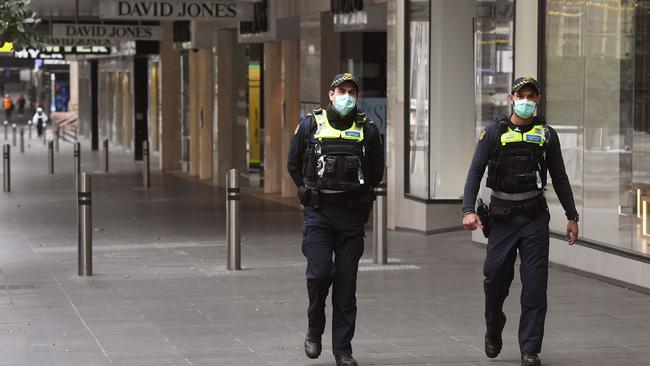
LOCKDOWN TAKES TOLL ON MENTAL HEALTH
Victoria has lost its title as the country’s happiest state, with locked-down residents racked with anxiety.
The state has pulled away from the rest of the country, an Australian National University study of the mental health of 3000 adults has revealed.
The gaps are widest in areas such as emotional distress, life satisfaction and likelihood of being infected by COVID-19.
In January, Victorians were the happiest people in Australia, but the new study shows the pandemic is taking its toll.
“Given the circumstances in Victoria, it is unsurprising there has been a greater increase in worry and anxiety among people in that state – jumping from 58.9 per cent in May to 68.1 per cent in August,” Centre for Social Research and Methods associate director and study co-author Nicholas Biddle said.
This compared with a jump in anxiety from 56 per cent to 60 per cent from May to August in the rest of Australia.
The figures come as 74 per cent of the 25,000 confirmed cases of coronavirus in Australia are in Victoria, along with 84 per cent of the deaths.
Victoria is not doing better than other states on any of the 12 variables researchers examined, and is much worse on eight of them.
While rates of loneliness declined across the country from 45 per cent in April to 35 per cent in May, they rose again in August, largely due to an increase in Victoria.
Given the “stage-four lockdown restrictions in Melbourne and stage-three restrictions in the rest of Victoria … it is not surprising that there has been a divergence in behaviour between Victoria and the rest of the country”, Professor Biddle said.
The survey also shows people across the country are less likely to follow physical distancing. In total, 72 per cent of Australians reported that in the seven days preceding the August survey they always or mostly avoided crowded places. This is compared with 94 per cent in April.
Co-author Matthew Gray said the latest poll revealed “worrying” trends related to physical distancing behaviour.
“For example, declines were greatest outside of Victoria. But even in that state, there has been fewer people following the requirements since April,” Professor Gray said.
These findings differ from other studies done by the Australian Bureau of Statistics, which recently found Victoria was little different from the rest of Australia in terms of household impacts of COVID-19. But the ANU study has a large sample size and a longitudinal sample.
– Susie O’Brien
